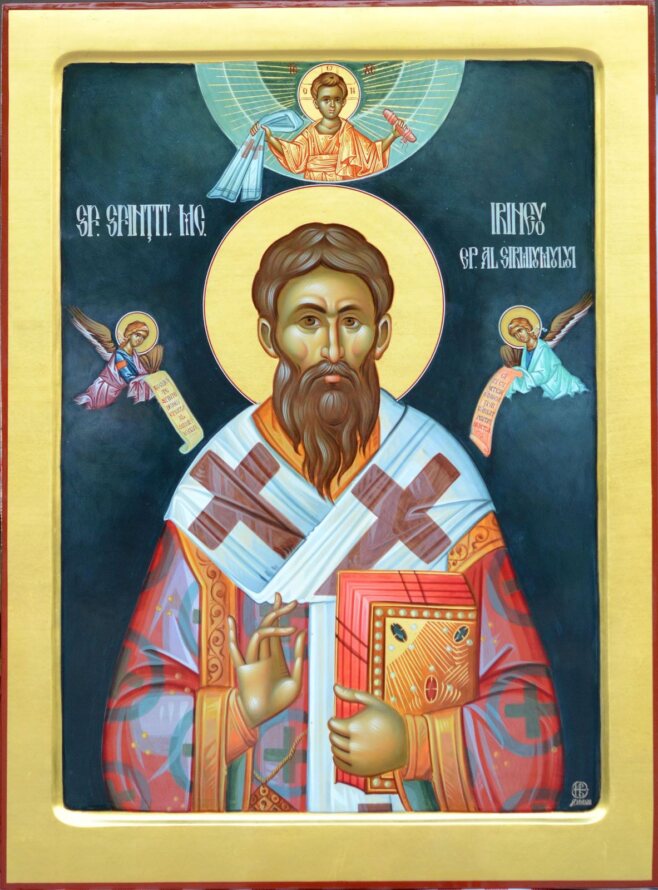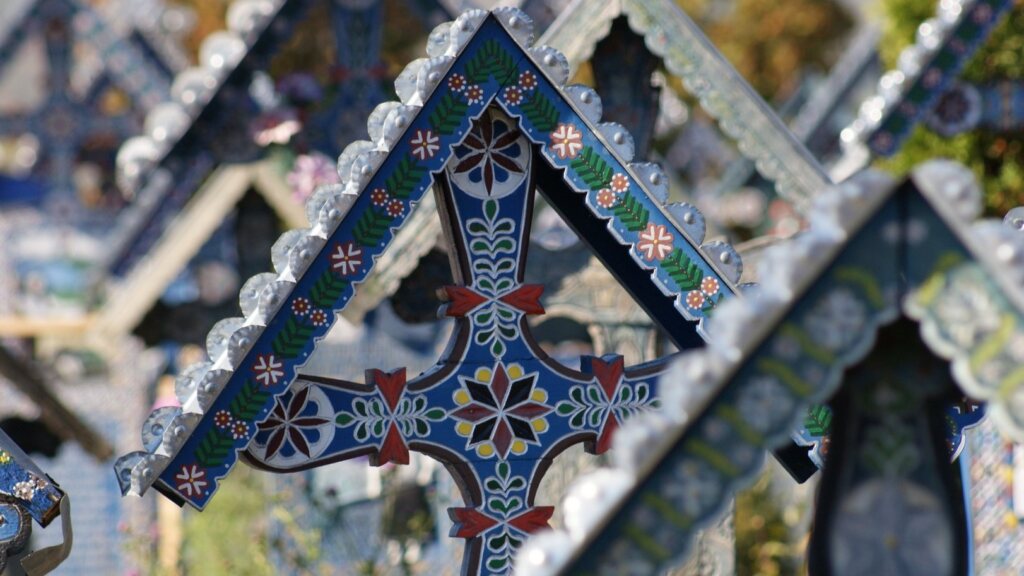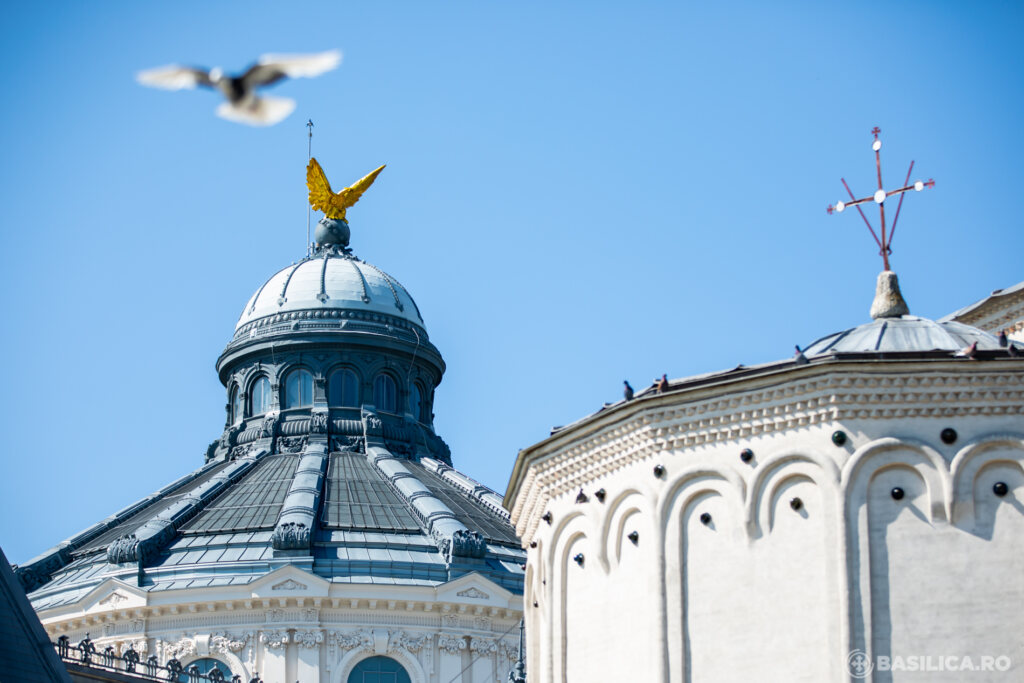Orthodox Calendar, April 6
Hieromartyr Irenaeus, bishop of Sirmium
He suffered during the persecution against Christians under the Roman emperors Diocletian and Maximian (284-305).
He was a presbyter, and he and his wife raised their children in Christian piety. Saint Irenaeus was greatly respected for his education and strict manner of life.
He was later made Bishop of Sirmium in Pannonia. Because of his fervent preaching of the Gospel he was arrested and brought before an official named Probus. Refusing to deny Christ and offer sacrifice to the pagan gods, the saint was handed over for torture.
Witnessing his torments were the saint’s parents, relatives and friends, who attempted to persuade him to submit, but the martyr remained steadfast.
After cruel tortures, the holy confessor spent a long time in prison. Probus tried to persuade the martyr, urging him to spare his life for the sake of his sons. Saint Irenaeus replied, My sons believe in God, Who will care for them. As for me, nothing will force me to renounce my Christ.
The governor ordered the saint to be thrown into a river. They led the martyr on the bridge crossing the River Sava, where he knelt and prayed to the Lord for his flock. Then they beheaded the Hieromartyr Irenaeus, and threw his body into the river.

Saint Eutychius, Archbishop of Constantinople
He was born in a village called “Divine” in the province of Phrygia. His father Alexander was a soldier, and his mother Synesia was the daughter of the priest Hesychius of Augustopolis. Saint Eutychius received the first rudiments of his education and a Christian upbringing from his grandfather the priest.
Once, while playing a childhood game, the boy wrote his own name with the title of Patriarch. By this he seemed to predict his future service. He was sent to Constantinople at age twelve for further education. The youth persevered in his study of science and realized that human wisdom is nothing in comparison to the study of divine Revelation.
Therefore, he decided to dedicate himself to monastic life. Saint Eutychius withdrew into one of the Amasean monasteries and received the angelic schema. For his strict life he was made archimandrite of all the Amasean monasteries, and in 552 was appointed to the Patriarchal throne.
When the Fifth Ecumenical Council prepared to assemble during the reign of the holy emperor Justinian (527-565), the Metropolitan of Amasea was ill and he sent Saint Eutychius in his place. At Constantinople the aged Patriarch Saint Menas (August 25) saw Saint Eutychius and predicted that he would be the next Patriarch.
After the death of the holy Patriarch Menas, the Apostle Peter appeared in a vision to the emperor Justinian and, pointing his hand at Eutychius, said, “Let him be made your bishop.”
At the very beginning of his patriarchal service, Saint Eutychius convened the Fifth Ecumenical Council (553), at which the Fathers condemned the heresies cropping up and anathematized them.
However, after several years a new heresy arose in the Church: Aphthartodocetism [asartodoketai] or “imperishability” which taught that the flesh of Christ, before His death on the Cross and Resurrection, was imperishable and not capable of suffering.
Saint Eutychius vigorously denounced this heresy, but the emperor Justinian himself inclined toward it, and turned his wrath upon the saint. By order of the emperor, soldiers seized the saint in the church, removed his patriarchal vestments, and sent him into exile to an Amasean monastery (565).
The saint bore his banishment with meekness, and lived at the monastery in fasting and prayer, and he worked many miracles and healings.
Thus, through his prayer the wife of a devout man, Androgenes, who had given birth only to dead infants, now gave birth to two sons who lived to maturity. Two deaf-mutes received the gift of speech; and two grievously ill children were restored to health.
The saint healed a cancerous ulcer on the hand of an artist. The saint also healed another artist, anointing his diseased hand with oil and making over it the Sign of the Cross.
The saint healed not only bodily, but also spiritual afflictions: he banished the devil out of a girl that had kept her from Holy Communion; he expelled a demon from a youth who had fled from a monastery (after which the youth returned to his monastery); he healed a drunken leper, who stopped drinking after being cleansed of his leprosy.
During the Persian invasion of Amasea and its widespread devastation, they distributed grain to the hungry from the monastery granaries on the saint’s orders, and by his prayers, the stores of grain at the monastery were not depleted.
Saint Eutychius received from God the gift of prophecy. He revealed the names of two of Emperor Justinian’s successors: Justin (565-578) and Tiberias (578-582).
After the death of the holy Patriarch John Scholastikos, Saint Eutychius returned to the cathedra in 577 after his twelve-year exile, and he again wisely ruled his flock.
Four and a half years after his return to the Patriarchal throne, in 582, Saint Eutychius gathered together all his clergy on Thomas Sunday, blessed them, and peacefully fell asleep in the Lord.
Troparion, tone 4:
In truth you were revealed to your flock as a rule of faith, an image of humility and a teacher of abstinence; your humility exalted you; your poverty enriched you. Hierarch Father Eutychius, entreat Christ our God / that our souls may be saved.

Venerable Gregory of Sinai
Saint Gregory was born around 1265 in the village of Clazomenia near the city of Smyrna in western Asia Minor. About the year 1290, he was captured by the Hagarenes and carried off to Laodicea. After he was ransomed, Gregory traveled to Cyprus where he was tonsured a rasophore monk. Afterward Gregory journeyed to St. Catherine’s Monastery at Mount Sinai where he assumed the great schema.
After a period at Sinai in which he fulfilled a number of obediences, including cook, baker, and copyist, Gregory left the monastery for Jerusalem. From Jerusalem he traveled to Crete where he learned the practice of the Jesus prayer and hesychasm from the monk Arsenios. After the turn of the century, Gregory moved on to Mount Athos, to the Magoula skete near Philotheou Monastery.
Thus, having gained the experience of many centuries of the monastic life from the ancient monasteries, Gregory settled himself down in a solitary place for hesychia, in a cell for silence and the unhindered pursuit of mental prayer combined with hard work. With his contemporary Gregory Palamas, he helped to establish Mount Athos as a center of hesychasm.
Concerned with spreading of monasticism, Gregory founded several cells on Mount Athos, as well as four monasteries in Thrace.
The last years of the life of Gregory are uncertain. On one hand his is found to have reposed in 1310 at Mount Athos. On the other hand, Gregory remained at Mount Athos until Ottoman Turks began to raid the monasteries of Mount Athos during the third decade of the fourteenth century. Then, it is said he took refuge in Bulgaria where he established a monastery in the wilderness at Paroria in the Strandzka mountains on the west coast of the Black Sea. There he reposed on November 27, 1346.






